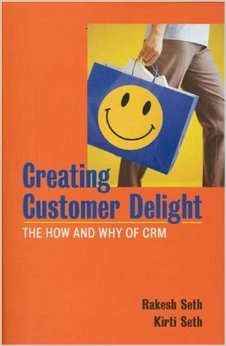Creating Customer Delight: Book Review
Finally a book on one of the most underplayed subjects in recent times- Customer Relationship Management. Creating Customer Delight: The How and Why of CRM authored by Rakesh Seth and Kirti Seth covers a plethora of subjects which are significantly crucial to the success of any organisation. The trigger points used in the book are market competition, wider consumer choice, fragmentation of the media along with the advent of the new media; technological advances and newer concepts like personalised customer management.
The book first looks at today's business environment where the customer is no more an underdog with choice restrictions, but the entity in command who can dictate the business decisions and marketing strategies.
The first chapter, The Growing Need for CRM puts into perspective today's highly competitive market environment, thanks to retail explosion and liberalisation. The theory of competition-centric marketing and the underlying customer relationship techniques are explained by analysing classic campaigns such as the cola wars, when the Pepsi and Coke marketing responses were determined by each other.The authors make it a point to talk about the importance of existing customers as companies tend to ignore the customer once the deal is over and think about only a prospect customer while planning the next steps. The sub-section analyses the significant role played by word-of-mouth publicity, a free-of-cost one, coming from a satisfied and loyal customer in a product's success in the market.
The Seths have something for the media as well. The second chapter, Taking an Integrated Approach details the significance of the present media segmentation to the business industry from a CRM point of view. Given the current fragmentation of the media the need of the hour is an integrated media approach. Then there is the emergence of new four Ps - Positioning, Passion, People and Personality to power the new strategy.
In the present scenario where Business Process Outsourcing (BPO) is on a roll, CRM in Call Centres would sound very topical. Here, the authors try to break the myth that carelines are just for complaints. The argument is that - "Ideally, a careline should be set up not only to handle complaints but also to provide assistance in using the product."
But the book is not devoid of some debatable comments. Consider, the introductory statement - `Successful CRM is what successful enterprise is all about. Every other discipline is secondary, be it marketing, finance, sales or IT.' One also gets a feeling that to explain the basic concepts of CRM the author has spent a lot of space as compared to the other important topics like database management and marketing strategies.
Overall, interlaced with interesting anecdotes and case studies from the real corporate world, the book depicts the core subject in a very convincing and easy-to-gather manner.








